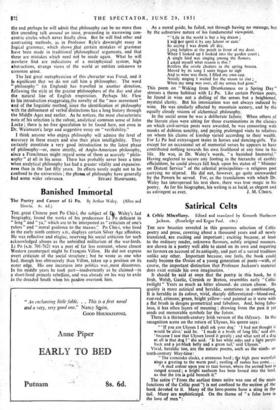Satirical Celts
A Celtic Miscellany. Edited and translated by Kenneth Hurlatone Jackson. (Routledge and Kegan Paul. 8s.)
THE new beauties revealed in this generous selection of Celtic poetry and prose, covering about a thousand years and all newly translated, are exciting and important ; exciting because, at least to the ordinary reader, unknown flavours, subtly original nuances, are shown in a poetry well able to stand on its own and requiring no favours on account of its antiquity, and part of a varied tradition unlike any other. Important because, one feels, the book could easily become the Ossian of a young generation of poets—with, of course, the important distinction that Professor Jackson's material does exist outside his own imagination. '
It should be said at once that the poetry in this book, be it Irish, Welsh, Gaelic, Cornish or Breton, resembles early "Celtic twilight" Yeats as much as bitter almond:, do cream cheese. Its quality is more satirical and heraldic, sometimes in combinatioq, It is heraldic in its colour, vivid, sharply differentiated—blood-red, rust-red, crimson: green, bright yellow—and painted as it were with a flat brush in designs geometrical and fabulous. And, being fabu- lous, it has often layers of meaning ; drawing from the past it yet sends out memorable symbols for the future.
There is a thirteenth-century Irish version of the Odyssey. In the recognition scene on the return of Ulysses, his queen says: "'If you ire Ulysses I shall ask your dog." I had not thought it would be alive,' said he. 'I made it a broth of long life,' said she. 'because I saw that Ulysses loved it greatly ; and what sort of a dog at all is that dog ? ' she said. 'It has white sides and a light purple back and a jet-black belly and a green tail,' said Ulysses. Vivid, heraldic too, are the nature poems, such as the ninth- or tenth-century May-time: "The corncrake clacks, a strenuous bard ; the high pure waterfall sings a greeting to the warm pool ; rustling oT rushes has come.... "A mad ardour upon you to race horses, where the serried host is ranged around ; a bright sunbeam has been loosed into the land. so that the iris is gold beneath it."
The satire ("From the earliest times satire was one of the main functions of the Celtic poet ") is not confined to the section pf the book devoted to it. Many of the love-poems have a sting in the tail. Many are sophisticated. On the theme of "a false love is the love of men": "They would offer silver and gold, they would offer treasure too ; they would offer marriage, as is right, to a woman—till morning comes."
Even magic becomes humorous. An Irish author of the four- teenth century visioned forth an airship floating over the monks in church at Clonmacnoise ; it drops its anchor onto the floor of the church, and the monks seize it, a man comes down from the airship as though swimming. The monks take hold of him and he says: "For God's sake let me go, for you are drowning me. Then he left them, swimming in the air as before, taking his anchor with him." There is little twilight about that sort of magic. Nor about the ninth-century epigram : "1 do not know with whom Edan will sleep, but I do know that fair Edan will not sleep alone." A different sort of sophisticatiaa, aesthetic, self-aware and hardly to be met with between Horace and Montaigne, is the marginal note by a ninth-century scribe: "Pleasant to me is the glittering of the sun today upon these margins, because it flickers so."
The Celts were clearly a passionate people, highly aware of the subtler feelings of sexual love; their elegies for dead lovers are
ardent gestures like those on a Cnossos frieze—but it is difficult to find "the blind hysterics of the Celts" mentioned by Tennyson. Their poetry is neither classical nor romantic in any ordinary sense ; perhaps the ultimate word remains heraldic. The passion and the heraldry, like sectors of fresh paint on a shield, come out most finely up the religious poetry, as much in this from the Irish tenth century, . " I should like to have a great pool of ale for the King of Kings ; I should like the Heavenly Host to be drinking it for all eternity," as in the traditional Scottish Gaelic of "The Virgin most excellent of face, Jesus more surpassing white : than snow, She like the moon rising over the hills, He like the sun on the peaks of the mountains."
It is difficult for the non-Celtic scholar to discuss Professor JaCkson's translations, but the poetry and prose read well, and certainly bring out those fine and original qualities mentioned. His notes and forewords to the various sections are models of pithiness and brevity ; the book as a whole is well produced and beautifully



































 Previous page
Previous page